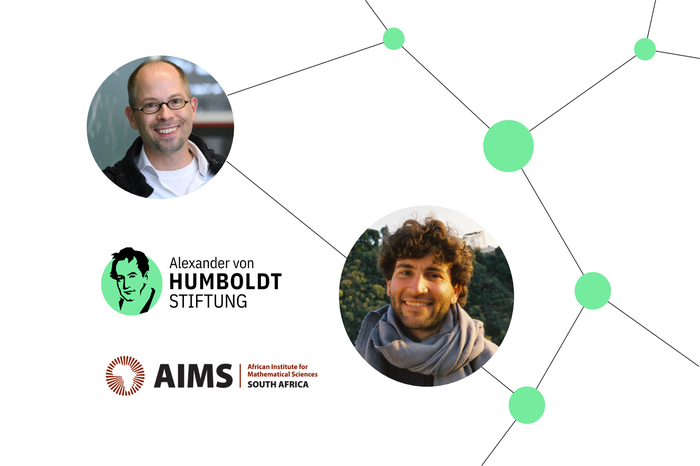Excellent Quantum Physics Research Between Europe and Africa
German Research Chair at AIMS South Africa: Cooperation between Prof. Dr. Eisert and Dr. Ryan Sweke, funded by the Alexander von Humboldt Foundation and DAAD
Quantum physicists at Freie Universität Berlin are collaborating with the pan-African scientific excellence network AIMS. As part of this collaboration, Dr. Ryan Sweke holds the German Research Chair at the African Institute for Mathematical Sciences (AIMS).
This scientific partnership in the field of Quantum Machine Learning (QML) was initiated by Prof. Dr. Jens Eisert and is funded by the Alexander von Humboldt-Foundation and the German Academic Exchange Service (DAAD). Freie Universität Berlin serves as the host institution for this international collaboration.
News from Jul 07, 2025
In July 2025, Dr. Ryan Sweke returns to Berlin to spend two months in discussions and brainstorming sessions with his mentor Prof. Dr. Jens Eisert. Dr. Ryan Sweke was a member of Eisert’s group between 2018 and 2022 and worked as a promising early-career scientist in research and teaching.
Together, they are now developing a strategy to combine the scientific expertise of European quantum physics research with the potential of the pan-African excellence network AIMS, aiming to deepen and accelerate fundamental research in the field of quantum computing.
Dr. Ryan Sweke Leads the German Research Chair at AIMS
As head of the “German Research Chair” at AIMS, funded by the Alexander von Humboldt-Foundation, Dr. Ryan Sweke will train young African researchers in Cape Town (South Africa) in the areas of Quantum Machine Learning and Quantum Computing. Numerous joint research projects and publications between researchers from the excellence network of Freie Universität Berlin and AIMS are expected to result from this collaboration.
A first workshop on the Theory of Quantum Learning Algorithms is already planned to be held at AIMS in October 2025.
To further support their goals, Dr. Sweke and Prof. Dr. Eisert have been awarded a grant within the university cooperation program of the DAAD from 2025 to 2029 with ca. 730 thousand euros.
Dr. Ryan Sweke is an Expert in Quantum Machine Learning
Dr. Ryan Sweke works at the intersection of quantum computing and classical machine learning. He develops and analyzes algorithms for QML and the simulation of quantum mechanical systems, thereby laying the groundwork for future quantum technologies.
Ryan Sweke completed his PhD in 2017 at the University of KwaZulu-Natal, focusing on quantum algorithms for the simulation of open quantum systems. He then joined Freie Universität Berlin as a Humboldt postdoctoral fellow and later as a senior postdoc. After his time at the Dahlem Centre for Complex Quantum Systems in Berlin, Ryan then spent just over two years as a research scientist at IBM Quantum in California. In January 2025, he returned to Cape Town to lead the “German Research Chair” at AIMS.
Networked Research Between Germany and Africa
Prof. Dr. Jens Eisert explains: “Researchers value Ryan’s interdisciplinary approach, which combines quantum physics, machine learning, and applied mathematics – all core areas of future-oriented technologies.”
“Our close collaboration and the establishment of a German Research Chair in Cape Town strengthen quantum research excellence in Berlin while serving as a model for modern, globally networked science – a benefit to both the German and international quantum community,” emphasizes Prof. Dr. Jens Eisert.
Alexander von Humboldt Foundation: German Research Chair in Portrait
1st AIMS Workshop and School on "The Theory of Quantum Learning Algorithms" (Oktober 27-30, 2025)
Keywords
- African Institute for Mathematical Sciences
- AIMS
- Alexander von Humboldt Foundation
- Dahlem Center for Complex Quantum Systems
- German Chair
- Jens Eisert
- QML
- quantum computing
- Quantum Machine Learning
- Quantum Physics
- Ryan Sweke
